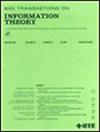列群上的核斯坦因不等式:理论与应用
IF 2.2
3区 计算机科学
Q3 COMPUTER SCIENCE, INFORMATION SYSTEMS
引用次数: 0
摘要
分布近似是机器学习中的一个基本问题,在科学和工程等各个领域都有大量应用。大多数近似方法面临的主要挑战是,需要解决用于数据建模的候选分布中存在的难以解决的归一化常数问题。这种难以解决的问题在旋转矩阵、正交矩阵等流形值随机变量的分布中尤为常见。在本文中,我们将重点讨论李群的分布近似问题,因为它们经常出现在许多应用中,包括但不限于计算机视觉、机器人、医学成像等。我们提出了一种新颖的斯坦因算子,它是一种无归一化损失函数,可导致内核斯坦因差异(KSD)。我们提出了一些理论结果,描述了这种新的 KSD 在李群上的特性及其最小化,即最小 KSD 估计器 (MKSDE)。我们提出并证明了 MKSDE 的性质,包括强一致性、CLT 和针对 von Mises-Fisher 的 MKSDE 的封闭形式,以及一般情况下,针对 $\mathop {mathrm {SO}}\nolimits (N)$ 的指数族的 MKSDE 的封闭形式。最后,我们介绍了一些实验结果,这些结果描述了 MKSDE 相对于最大似然估计的优势。本文章由计算机程序翻译,如有差异,请以英文原文为准。
Kernel Stein Discrepancy on Lie Groups: Theory and Applications
Distributional approximation is a fundamental problem in machine learning with numerous applications across all fields of science and engineering and beyond. The key challenge in most approximation methods is the need to tackle the intractable normalization constant present in the candidate distributions used to model the data. This intractability is especially common in distributions of manifold-valued random variables such as rotation matrices, orthogonal matrices etc. In this paper, we focus on the distributional approximation problem in Lie groups since they are frequently encountered in many applications including but not limited to, computer vision, robotics, medical imaging and many more. We present a novel Stein’s operator on Lie groups leading to a kernel Stein discrepancy (KSD), which is a normalization-free loss function. We present several theoretical results characterizing the properties of this new KSD on Lie groups and its minimizer namely, the minimum KSD estimator (MKSDE). Properties of MKSDE are presented and proved, including strong consistency, CLT and a closed form of the MKSDE for the von Mises-Fisher and in general, the exponential family on
$\mathop {\mathrm {SO}}\nolimits (N)$
. Finally, we present several experimental results depicting advantages of MKSDE over maximum likelihood estimation.
求助全文
通过发布文献求助,成功后即可免费获取论文全文。
去求助
来源期刊

IEEE Transactions on Information Theory
工程技术-工程:电子与电气
CiteScore
5.70
自引率
20.00%
发文量
514
审稿时长
12 months
期刊介绍:
The IEEE Transactions on Information Theory is a journal that publishes theoretical and experimental papers concerned with the transmission, processing, and utilization of information. The boundaries of acceptable subject matter are intentionally not sharply delimited. Rather, it is hoped that as the focus of research activity changes, a flexible policy will permit this Transactions to follow suit. Current appropriate topics are best reflected by recent Tables of Contents; they are summarized in the titles of editorial areas that appear on the inside front cover.
 求助内容:
求助内容: 应助结果提醒方式:
应助结果提醒方式:


